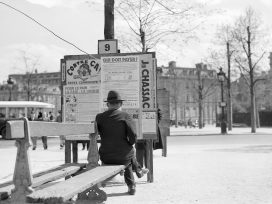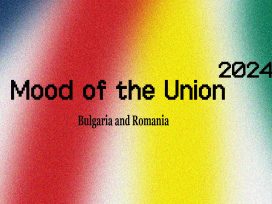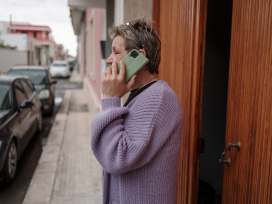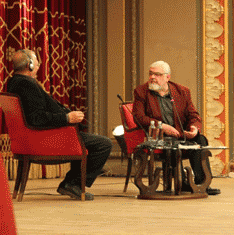 Andrei Plesu: Good evening ladies and gentlemen. Allow me to begin by thanking Adam Michnik. I know that he is really hassled, he is invited everywhere all the time. As he himself once said, “heroes are tired”. I know that, wherever he goes, he comes across pretty much the same issues and, given his free, authentic and lively temperament, it is not easy for him to comply. I thank him once again for coming.
Andrei Plesu: Good evening ladies and gentlemen. Allow me to begin by thanking Adam Michnik. I know that he is really hassled, he is invited everywhere all the time. As he himself once said, “heroes are tired”. I know that, wherever he goes, he comes across pretty much the same issues and, given his free, authentic and lively temperament, it is not easy for him to comply. I thank him once again for coming.
I have an old affection for Adam and an even older admiration, because he is like no one else, he is unclassifiable: it is hard to ascribe, describe or systematize him, he is unpredictable and yet extremely consistent and coherent. He is the most tenacious fighter I have ever met, and the most good-natured. He is twenty dissidents put together, but his is not a fundamentalist kind of dissidence. His dream was not to go to jail, to become a martyr. He naturally fought for what all anti-communist dissidents fought for – liberty, dignity, honour – but all these words were but the inner source for a fight whose main value was normality. All these big words mean something as long as they translate into a normal life. Adam’s annoyance during the dictatorship was that normal life was not possible. It was not possible to think what you wanted, say what you wanted, meet whom you wanted – all these things were subject to “intermediation”, they were possible only with prior approval. I think that all these things made him very angry.
I remember a phrase of his: “Once, when I was arrested, it was not in a basement where we were planning to take the Central Committee by storm, but rather, when I was with a lady”. This says something about the way Adam wants to live: not like an idolater of the kind of heroism which turns immediately into gestures, but rather, like a man who is real, alive. Bertolt Brecht once said – Adam enjoys using this quote – “Unhappy the land that needs heroes!” It is because of this cult of normality that I love Adam. To coin a phrase, Adam Michnik has rehabilitated the “banality of good”, he has helped restore what appears banal, that is, the normality of a whole life. Adam, welcome!
Adam Michnik: Andrei, first of all, I would like to thank you for inviting me. I love coming to Romania, because Romania is a country that fascinates me, it is a country which, in a certain sense, has a history similar to that of Poland. I like to look at Romania in the Polish mirror, and at Poland in the Romanian mirror.
What you said about me reminds me of a funeral speech. I must die quickly so I don’t spoil anything. I wish to assure you, ladies and gentlemen, that what my friend Andrei said about me is not true. I would have much to lose if you were to know me better. I wish to tell you that Poland and Romania are special places today. All our generation’s fundamental dreams have come true. We dreamed about freedom, we have it now. We dreamed about open borders, we have them now. We dreamed about free parliamentary elections, we have them now. We dreamed about a cultural life without censorship and this now exists. But we are angry. Why? I think this is what we will talk about today.
AP: Adam, a few months ago Herta Müller sat on the chair you are now sitting on. Gabriel Liiceanu, who is Herta Müller’s Romanian publisher, sat on my chair. To cut a long story short, Herta Müller – who, as we both agree, is an excellent novelist – told us off. She was upset with Romanian intellectuals who, during the communist regime, did not do enough: either they declared that they “resisted through culture” – a concept which stirred a lot of debate – or they collaborated directly with the regime. But even if they did not collaborate, simply by withdrawing into an insular field of competence, they were accessories to that regime.
I must admit that, at first, I too was against the idea of “resistance through culture”. I told myself that, if somebody did his or her job well, this was not tantamount to “resistance”. If a carpenter built chairs or a surgeon operated during communism, that did not mean they “resisted” through carpentry or surgery. But slowly I realized this was a sophism. If your profession is to write and think, and the context you find yourself in wants to impose a certain way of writing and thinking, and you do not consent to it, this means you resist through culture. And we resisted through culture just as we resisted through humour or food – I believe that the only samizdat possible in Romania was food: we managed to find food at a time when there was none to be found. We also resisted through good manners what you once called the “totalitarian uncouthness”. We resisted in various ways. And yet Herta was not happy.
Herta was the first important dissident whom I have heard reproaching others. I have never heard you reproach anyone, nor have I heard Havel do so, nor, to return to Romania, Radu Filipescu nor Doina Cornea, let alone Mircea Dinescu. If you weren’t from Romania and didn’t know the situation, you might have concluded, judging from the applause Herta received, that the whole Romanian population, with the exception of a few intellectuals, had fought in the streets. Here, then, was someone finally talking on their behalf, telling the truth! All the more so since the victim was ready-made – there have always been plenty of people opposed to “reactionary intellectuals”, and here was finally someone setting them straight.
I will say one more thing. Back in 1978, Piotr Wierzbicki published an essay in Poland entitled Treatise on Larvae, about intellectuals who had collaborated. You strongly criticized this text, observing that after the Polish People’s Party and underground movements had been annihilated in 1947, the intelligentsia withdrew into an inner exile whose very silence was a form of resistance. I don’t want you to help us find a new justification for our lives spent “resisting through culture”, I’m just curious to know how you see this problem today.
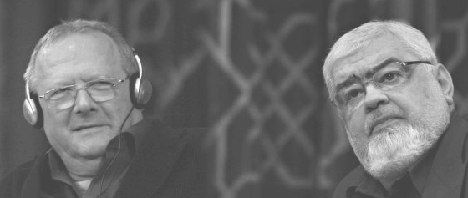
AM: I’ll begin with a paradox. If I remember rightly, twenty years ago it was Gabriel Liiceanu himself who was reprimanding others for not being consistent in their anti-communism. It’s a historical paradox. A philosopher should be careful when donning the prosecutor’s robes. If we are talking about Herta Müller, then I share your opinion, she’s a wonderful writer. But the truth is that I do not understand why, twenty years on, she was applauded for condemning Romanian intellectuals. Given what I know about communism, in some situations silence can be an act of heroism. It is very hard to put out a fire with ink. The terror which existed in Romania is probably comparable to the one in Albania or China during the cultural revolution. Herta Müller knows this very well, which is why she emigrated as soon as she could. However I find it rather risky, from an emigrant’s point of view, to morally reproach those who did not emigrate.
We are dealing with very sensitive issues. Everyone had the right to emigrate, but not all Romanians or Poles could have done so. It was a difficult choice. But I have enormous respect for those who did not emigrate, who wanted to stay where life was most difficult. I have never criticized emigrants. But I don’t enjoy listening when they accuse others, such as me, of not having been courageous enough.
It’s very hard to define what kind of resistance should have been chosen during the dictatorship. Certainly, you are right, we cannot say that a dentist acted heroically just by doing his or her job well. But a doctor who violated the Hippocratic oath deserves condemnation. I know doctors who sent regime opponents to the psychiatric ward. I know doctors who refused to treat patients on the orders of the secret services. As far as I’m concerned, any doctor who didn’t violate the Hippocratic oath during the dictatorship is worthy of the highest respect.
The communist regime wanted to teach us something new about culture, about history. Those who wrote books about Kant, Shakespeare or Dante defended the fundamental values of European culture. They didn’t quote Stalin or Ceausescu, they simply wrote an honest book. This often required courage. Whatever resistance there was in Russian, Romanian or Polish cultures, it was due not so much to those people who went to the barricades, but those who simply did a job well. I was taught at university by lecturers who, during the war, had been active in the resistance movement. In 1945, when the Soviets came to power, they had to make a choice: either join an anti-communist movement, emigrate, or take up a post at a university and teach things that were true. I’m in their debt, I thank them for not joining an anti-communist movement or emigrating, for staying in Poland to teach instead.
That would be my first observation. The second one is this. If I understand it correctly, Herta Müller reproached Romanian intellectuals for not being heroes. However, you are allowed to expect heroism only from yourself, not from someone else. There will always be people who will say “you were not a hero till the end”. This is a Bolshevik attitude. In Russia there is a whole legion of people who use this kind of argument. Why was Solzhenitsyn arrested? Was it for his anti-communism? No, it was because he was a Trotskyite. And how is communism different from Trotskyism? It isn’t. So why should we respect Solzhenitsyn? He wrote books, he went to America and made a lot of money. Why should we respect him? Sakharov? He invented the nuclear bomb! Viktor Nekrasov? He received the Soviet “Nobel Prize”. Rostropovich? And so on.
AP: Why should we respect Adam Michnik? He is a Trotskyite, a Mason, a crypto-communist…
AM: But I have never been a great writer or physicist. In short, I do not understand Herta Müller. I do not understand why she is reproaching Romanian intellectuals, who faced being sent to prison. Why isn’t she telling off Helmut Kohl or François Mitterrand, who were never in any such danger?
There is one last thing I wish to discuss. Dissidents had to answer this question: “How to get out of an impossible situation?” I confess I collaborated with the governor of the prison where I stayed. Instead of fighting him every day, I resisted in a dignified way. I did my best to fight my condition as prisoner and, at the same time, do something worthwhile: write an article, send it out into the free world and have it read on Radio Free Europe. Some people reproached me for writing articles instead of going on hunger strike. I replied that it was enough that the whole of Poland was starving, why should I go on hunger strike as well? In short, I think it is our intellectual responsibility to quarrel with totalitarianism, but we must not turn this quarrel into an instrument. It must not become part of our political polemic.
Today, people in their thirties write that between 1945 and 1950 Czeslaw Milosz worked for the diplomatic service in Washington. Milosz is the author of one of the most profound analyses of communism. Others write that Zbigniew Herbert repeatedly met with the secret services in safe houses. This is an illness of our time: we try to destroy moral authorities. Everyone has to be brought down from the pedestal that the public opinion put them on. This is a dangerous hobby. It is not the way to the truth but to nihilism. I don’t think Herta Müller fully understands these things. There are always two kinds of philosophy. If we look for a blemish on everyone’s face, then there will be no one without blemishes. But if everyone is guilty, then no one is guilty. I will then be as responsible as Ceausescu. This is very dangerous.
AP: It could be said that you are a forgiving person. You were able to write from your prison to the Interior Minister, General Kiszczak, who had arrested you and offered to send you to the French Riviera to calm down. You politely replied that he was an ass for suggesting that. Then things changed and General Kiszczak ended up in the dock. Who defended the general? Adam Michnik. Then you were condemned for talking to General Jaruzelski – and how you talked! It is true that Jaruzelski was an interesting interlocutor: I was amazed to see him quoting Tocqueville. (I could not imagine a discussion with Ceausescu quoting Max Weber.) This cannot excuse him. But this ability of yours to put yourself in your enemy’s shoes, never to think of yourself as one who is right, justified and legitimate, is this a personal vocation? Is it a gift? Is it a Christian dimension of your personality?
Although people won’t believe this, I too can be decent. But things have happened to me which have put me on the spot. I will give you one example and then stop. In 1990 I was Culture Minister. An older, respectable, distinguished lady came to see me and bring me a letter from her husband. She told me that her husband was in prison, was suffering, was ill and old, and her children were being persecuted. She was talking about Paul Niculescu-Mizil, who had briefly been minister in the first cabinet after Ceausescu’s fall and then arrested. He was one of the nomenklatura who had been less tainted. After the lady was gone, a famous film director came to see me. I told him that her visit had left a bitter taste in my mouth. I felt that we were behaving like “them”, reacting symmetrically, taking our revenge, and I don’t like to see people suffer. He replied: “Stop this sentimentalism. Did they have any scruples when they arrested our parents and grandparents?” I was not persuaded.
But then I read the letter. In essence, it said this: I am innocent, I have been arrested for political reasons; but it is not just I who is innocent, the whole of the Central Committee is innocent; and not only the Central Committee, but communism. As I held this document in my hand, I felt stuck. In order to be able to forgive someone, they have to ask you for forgiveness, to admit their mistake. But how could I forgive in this particular case? According to him, it he was he who was supposed to forgive me. When faced with such an attitude, the problem of forgiveness collapses. Help me with this.
AM: The problem of forgiveness can be posited in various ways. Can you forgive a machine which does not work properly? People should be forgiven not for what they think about the Central Committee or communism, but for what they have done. If they have committed a crime, it no longer matters what they think about the Central Committee or communism. The act of forgiving is always an individual one. Zbigniew Herbert wrote, “It is not within your power to forgive in the name of those who were betrayed at dawn”. I agree with him. You can only forgive the things that concern you and not others. This would be a fundamental condition. When the director Krzysztof Zanussi, who is a good friend of mine, criticized me in the media by asking “Why does Adam Michnik forgive in my name?”, I told him: “Krzysztof, I only forgive my years in prison, I don’t forgive anyone for your years in prison, only you can do that. And the fact that you did not spend one minute in prison is your problem.”
The problem is that nobody is more important than the “eleventh-hour anti-communists”. If we take Andrei’s concrete example, it is one thing to forgive a dictator who keeps people in prison, and another to forgive a dictator who tried to lead Poland out of dictatorship through non-violent means. If it hadn’t been for Jaruzelski and Kiszczak we would not have had the “round table”, we would have had another Bucharest – with the Securitate, the snipers and everything else. When I went to take part in that round table, my legs were shaking with fear. It was taking place in a palace and we had to go to a room upstairs. General Kiszczak was waiting at the top of the stairs and was shaking hands with everybody: Walesa, Geremek, Mazowiecki, Jacek Kuron… I got scared and hid in the toilet downstairs. I was afraid that, if my wife saw me on TV shaking hands with Kiszczak, she would throw me out. After three minutes I came out of the toilet and had a look; Kiszczak was still there, waiting for me. So I decided to be a hero and went up the stairs. He said: “Hello, sir!” and I replied: “Hello, general!”
Up until that point we had only known each other through our correspondence – the letter Andrei mentioned. But the truth is that General Kiszczak was very much involved in the success of the round table. In Spain, after a few years of transition, the Spanish secret services staged a coup led by Colonel Tejero. To this day you can see the holes in the ceiling of the Spanish parliament made by the bullets back in 1981. There is not one bullet hole in the ceiling of the Polish parliament. Kiszczak and Jaruzelski made sure there would not be any secret service revolt against the changes in Poland. Things were different in Romania. There, the Communist Party gained sovereignty from the USSR fairly quickly, during Gheorghiu-Dej’s regime. In Poland, this was impossible, because Poland represented the Soviets’ access to Europe. We had their troops permanently stationed in our country. At one point, the Polish communists had to think about their margin of freedom, what they could and could not do without permission from Moscow. In short, they were not sovereign. For me, 1989 was the moment of truth for communism. I asked myself what the communists would do. Would they go to Moscow or act like Polish patriots? And they acted like Polish patriots. At that point it was obvious to me that we had to put a stop to the logic of revenge.
Certainly, someone who has committed a crime has to suffer the consequences. But this must be a legal decision, not a political one. Politicians must never administer justice. When politics enters the courtroom, justice leaves by the back door. It is always like this. I would make another observation. Poland is obviously a Christian country. We are all to a certain extent moulded by Christian culture and morality. In the Gospels it says that you will not forgive seven times but seventy-seven. But maybe my copy of the Gospels was forged by the Masons and Trotskyites.
This would be the first perspective. The second is that of a Warsaw gangster. There is a gangster’s code of honour: if someone is on the ground, you don’t kick him. We the gangsters, the hoodlums of Warsaw, do not kick someone on the ground – we left that to the communists. So if I speak of forgiveness, I do so in relation to selfishness and not selflessness. If I do not forgive, I do myself an injustice, I become a more evil and stupid man. But if I forgive, it is one of those rare moments when I can see myself in a favourable light.
AP: You once said that nationalism, to the extent that it means hating other ethnic groups, runs counter to the Christian idea. For Christianity the ultimate sin is pride, empty praise, the inflation of the self. Nationalism is a kind of collective pride: “I am nobody, I don’t engage in empty praise, but my nation has the right to do so.” However there is something in your discourse that I find difficult to relate to, given my Romanian experience. You often speak of your Polishness, that you represent Poland: you invoke Poland. Indeed, Daniel Cohn-Bendit once started a conversation with you by asking: “Adam, why do you keep saying you are Polish?” If I adopted patriotic language in Romania, it would sound strange. In Romania, ideas of national identity have been compromised because of all sorts of demagogues and scoundrels, and one is too embarrassed to put oneself in the same category. However, the same thing that can sound awful in my mouth in a Romanian context, sounds right in yours. How do you do it?
AM: I don’t have a problem with my ethnic origin. In 1968, during a big demonstration, Wladislaw Gomulka said that I was Jewish. Since then, nobody in Poland has been able to expose me as a Jew! I had some problems in Israel and New York – some people were upset with me because I said I was Polish, after what they had heard from Gomulka… But I was of the opinion that, since Hitler had taken it upon himself to decide who was Jewish and who was German or Polish, I was no longer going to trouble myself with this problem. When I was in prison, I was called for interrogation and asked: “Mr Michnik, when you leave prison, will you emigrate to Israel?” I replied: “Why should I emigrate to Israel?” “Because today any Jew can emigrate to Israel.” I got really angry and told them: “I will emigrate to Israel the day after you all emigrate to Moscow.” This was the last time they made that suggestion.
Why do I believe that being Polish or Romanian is of value? I will refer to Andrei’s book On Angels. He observes how dangerous it is to “angelize a nation”. It’s a sort of degeneration of the Christian idea: faith in one’s nation cannot be the same as faith in God. If faith in one’s nation replaces religion, this will lead you straight to hatred and barbarity. I agree. That is why in Poland I have always been an enemy of nationalism and chauvinism. On the other hand, I am fully aware that we are fulfilled as individuals in the sphere of our national culture, in the sphere of language and historic tradition. My friend Cohn-Bendit is a European and a full-blooded cosmopolitan. He is a German Jew educated in France, whose national feelings only show through when the French football team plays against Germany. I always ask him: “Who do you want to win?” and his reply is: “the French”. There are people who can live with a supranational identity. Zbigniew Brzezinski was like that; so was Joseph Conrad; so was Eugène Ionesco, who had both French and Romanian identities. This is fine, there is nothing wrong with that; we live in a world of our own identity.
However identity can degenerate in two ways. In my life, the first degeneration was caused by Bolshevism. It was a brutal censorship of the Polish national tradition. The second one was caused by nationalism. I am told that I have to listen to any Polish leadership, even if it is stupid and reprobate, just because it is Polish. I thought only the Russians were of the opinion that they had all that was best and worst in the world. I have always quarrelled with them, told them that they did not hold the monopoly on all the asses in the world: “Maybe we Poles are not as numerous as you are, but we can bring our own collection of asses into the competition – communists, fascists…” On the other hand, I feel enriched if I read the poetry of Mickiewicz, Milosz, or Szymborska, if I listen to Chopin’s music, or watch Wajda’s films. I have the feeling that I am somehow in a parental home. Firstly, this means you have to look after your parental home: you have to keep it clean, make sure there are no rats. This isn’t nationalism, it’s just taking care of your own home. Secondly, this home cannot be closed. It has to be open to others. I am for an open Poland, but it is a home which has its own rules. In this home one does not spit or use force. This is my Poland, it is this kind of Poland that I love. This does not mean that I do not look at it with a critical eye; Polish culture is very self-critical. I could never allow myself to think “I love Poland more than the truth”. But I do believe that the truth is never against Poland. It is lies which are against Poland.
One final observation. Certainly, in Poland too, it is enough to put on white breeches, paint one leg red and think that everybody must stand to attention. I look at this pseudo-patriotic clownishness just as Milosz, Gombrowicz or Mrozek did. But it annoys me to hear this opinion expressed by Erika Steinbach or a chauvinistic Russian. As a Pole I could never allow myself to mock the Lithuanians, because Lithuania is small and Poland is big. Likewise, I don’t like it when Germans or Russians look at Poland with irony. We have to be somewhat humble with those who are weak – with Lithuania, Ukraine, Belarus. The Russians should be very careful when they joke about Poland and Polishness. That is why I am irritated by fragments in Dostoyevsky’s work. But I always tell myself that not everybody in Russia is Dostoyevsky and that he, as his name shows, was Polish.
AP: We get on so well, I feel like asking you to dance with me. But I am afraid time is up, which is a shame because I wanted us to talk about decommunization, about lustration laws, about your disappointments, about words which have been compromised and how they could be reclaimed (for example “tradition” or “elite”, which have become questionable today), about the political model you imagine. You have often quoted Kolakowski, who said that, ideally, there should be a liberal conservative socialism – that is, social protection from the socialists, tradition from the conservatives, and free-market economy from the liberals. We should have also talked about options, about Left and Right. I remember that you were faced in one discussion with a question about options and you replied: “Listen, if you want to ask me whom I would choose between Hitler and Stalin, I will tell you that I prefer Marlene Dietrich”.
But I would like to ask you one last question, totally unrelated to what we have discussed so far. A question which will take us into the private sphere. Adam, we are getting old. We are still kicking, but something somewhere is creaking. Do you have the time, the will or the inclination to think about death?
AM: That is a very good question. Certainly, it is also a very personal one. I wasn’t expecting it. I am very emotional at the moment because, two days ago, one of the most remarkable Polish intellectuals died: Jozef Zycinski. Nobody was expecting it. He was a philosopher and essayist, two years younger than me. Certain thoughts I had during the totalitarian period came back to me. I thought about what Dietrich Bonhoeffer wrote when he was in prison: that we should live by ourselves, as though God had turned his back and everything depended on us. This could be turned on its head, so that the Last Judgement happened every day, and that every moment of our lives could turn out to be the last. That is why one must always be careful not to do something reprehensible.
AP: During a conversation between Józef Tischner – a theologian who has in the meantime passed away and who was a friend of Adam Michnik – and some people, he asked…
AM: It was a discussion between Tischner, who was a Catholic priest, and some peasants from the mountains. Mountain people in Poland have never been subdued, they have always been free…
AP: That’s true. So, when Tischner asked “I wonder why God created Adam Michnik?”, one of these mountain people replied: “So that clever people can become a bit more clever, and stupid people can become even more stupid”. I for one will go home asking myself which category I belong to after this wonderful conversation, for which I thank you.
AM: Thank you, Andrei. I have to say there is one thing I have definitely learned after our discussion: that you and I have to hold a dialogue fleuve where we will clarify absolutely everything. Except death. Something has to be left unexplained.
AP: I take your proposition very seriously and, should circumstances prevent us from making this happen, I suggest we hold a meeting in Paradise. Do you not count on it?
AM: The idea that I will go to Paradise would mean doubting the good Lord’s justness.
AP: I forgot to say Gabriel Liiceanu is in the venue so…
Gabriel Liiceanu: Adam, I wanted to tell you that the discussion with Herta Müller left a bitter taste in my mouth because it turned out that a handful of intellectuals, who had not prostituted their words before 1990, it turned out that we had been a bunch of cowards. Your visit leaves a bitter taste in my mouth because it turns out I was a prosecutor in the 1990s. Two labels – I am not comfortable with either of them. So this is my question: Adam, do you know what I asked of those who had made communism possible twenty years ago, what prosecutor Liiceanu asked of them? He asked them to stand aside for a while and not make us “happy” for a second time. Do you think that was a bad thing?
AM: Of course it was a bad thing. It was bad because you, a remarkable philosopher, a man who has done so much for Romanian culture, you took it upon yourself to stigmatize a certain category of people. They were not concrete individuals X or Y, but a whole category. You said “communists”, and I say that the greatest tragedy of the twentieth century is generalization. There was a certain kind of philosophy of de-communization – and you were not one of the extremists, I used your example because you were the one who talked to Herta Müller – whereby those who had been in power had to be eliminated. I saw in this a certain echo of the Bolshevik way of thinking. The Bolsheviks refused a certain category of people the right to exist in public life.
You, a remarkable philosopher, you knew very well how complicated the problem of communism had been in Romania. Suddenly, that language of anti-communist generalization became unacceptable to me. I saw the same thing happen in Poland, Russia, Czechoslovakia, Bulgaria and so on. I have often been attacked, called a traitor because I have been against de-communization. But today, after twenty years, I can honestly tell you I have the feeling I was right, despite the fact that I was going against the current of the public opinion. I did not mean to hurt you, I very much appreciate your work, we have published one of your essays in the Wyborcza magazine. But there is a paradox in all this: the logic of accusation has no end. You accused the communists, Herta Müller accused you of conformism, and I believe that both statements have done an injustice.
AP: I have to say something in defence of my friend Liiceanu. At the time he did not speak about communists in general, he spoke about the category of those who had been directly involved in a government that had led to concrete results. Had he been a Bolshevik, he would have asked for their arrest, their execution even. But he only asked them to stand aside, he asked for their absence, he did not suspend their existence nor did he ask for it. It was also a moment of exasperation; that appeal of his was made immediately after 1989, when a general exasperation took over. But as someone who knows him, I can tell you that he is not after blood.
AM: I can agree. At that point Gabi was not a Bolshevik, but a Menshevik.
Bucharest, 14 February 2011

 Andrei Plesu: Good evening ladies and gentlemen. Allow me to begin by thanking Adam Michnik. I know that he is really hassled, he is invited everywhere all the time. As he himself once said, “heroes are tired”. I know that, wherever he goes, he comes across pretty much the same issues and, given his free, authentic and lively temperament, it is not easy for him to comply. I thank him once again for coming.
Andrei Plesu: Good evening ladies and gentlemen. Allow me to begin by thanking Adam Michnik. I know that he is really hassled, he is invited everywhere all the time. As he himself once said, “heroes are tired”. I know that, wherever he goes, he comes across pretty much the same issues and, given his free, authentic and lively temperament, it is not easy for him to comply. I thank him once again for coming.


